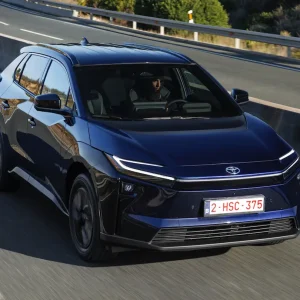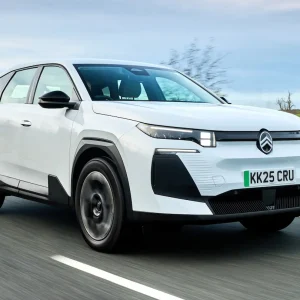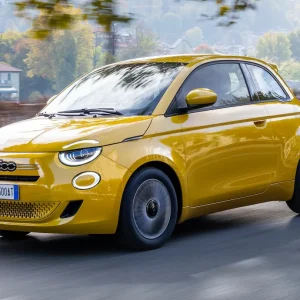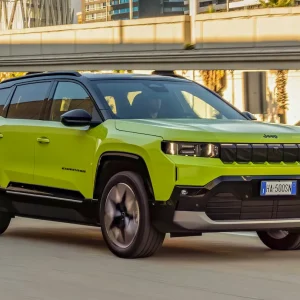The Mokka, launched in 2021, and the new Astra launched in 2022, have proved to be key models in the Vauxhall brand’s renaissance under new Stellantis management. Most recently, the Astra has caught our attention with its attractive blend of competitive pricing and plug-in hybrid versions to keep running costs down. It is well-equipped and looks great inside and out. So much so, the Astra took our Family Car of the Year prize at the 2022 Business Car Awards.
Could it be a case of more of the same this year? As Vauxhall has already announced that full EV Astra models will be here by the summer. Firstly though, after hints dropped at the international launch last year, we have sportier versions of the Astra hatch and Sports Tourer estate, resurrecting the GSe badging that was first seen on the Monza Coupe in the ’80s – although that was the GS/E.
This time round the GSe performance sub-brand stands for Grand Sport Electric and, as the name suggests, this Astra is electrified – via a well-tested route. This is a new powertrain and combines a 180hp, 1.6-litre petrol turbo engine with a 118hp electric motor and 12.4kWh lithium-ion battery. Resulting in 225hp, 360Nm of torque, 0-60mph acceleration in 7.5 seconds and a top speed of 146mph. Of more interest to business buyers is the confirmed 8% BIK figure (12% for the Sports Tourer because of the slightly lower EV range), 25g/km CO2 emission figures (26g/km Sports Tourer), and combined fuel consumption up to 256.8mpg. The hatch can be driven up to 40 miles (39 miles for the Sports Tourer) on electric power alone.
The Astra GSe starts off smoothly, keenly, and quietly in Hybrid mode, although there are also Electric and Sport modes. In Electric mode it will carry on up to 84mph until the battery runs out, then it will swap into Hybrid mode. To make the most of the battery range, we spent most of our time in Hybrid mode. Which felt like the Electric mode, although the engine is quickly woken with a quick jab of the accelerator. In Sport mode, there are changes to the weighting of the throttle and steering. Performance is best described as willing but sometimes noisy. Sharp throttle inputs and heavy acceleration usually involve working the vocal petrol engine hard. This Astra feels fastest with plenty of charge in the battery; without, and it’s slightly more hesitant.
Another key part of the GSe makeover for the Astra are changes to the dynamics. It sits 10mm lower for starters, then there are 11% stiffer springs and special oil-filled dampers manufactured by KONI, that Vauxhall claims provide a blend of dynamic driving and comfort. One of the highlights of the standard Astra is the refinement and general damping. Despite these upgrades, more performance, and the unique 18in ‘Commodore’ wheels, the driving experience is largely unchanged. There’s perhaps a touch more road noise, but the ride is surprisingly comfortable and composed for what is supposed to be a sporty Astra. Elsewhere, the recalibrated steering has more feel, but although an accurate and composed handler, it doesn’t feel as sharp as the sporting makeover would suggest. However, the brakes seem far less snatchy and easier to modulate over the standard car.
Finishing this package, is the exterior and interior styling. Already a looker in either hatch or estate form, thankfully the changes are subtle and well executed. At the front, the GSe gets a bespoke front bumper and fascia, bigger wheels, a black roof with black roof rails for the Sports Tourer and distinctive GSe badging.
Inside, the GSe versions of the Astra remain distinctive and minimalist. The only changes are the addition of supportive sports seats and a specific leather-trimmed steering wheel.
Space in the front is fine, but rear space is no better than average, although the 352-litre boot (or the 516 litres in the Sports Tourer) is practically shaped.
This must be the most appealing Vauxhall Astra available, but without the GSe performance additions, the standard Ultimate PHEV model does largely the same job for a bit less cash.
Vauxhall Astra 1.6 PHEV GSe
P11D: £40,495
Residual value: 40%
Depreciation: £24,327
Fuel: £6,340
Service, maintenance and repair: £1,701
Cost per mile: 53.94p
Fuel consumption: 256.8 mpg
CO2 (BIK %): 25g/km (8%)
BIK 20/40% a month: £54/£108
Luggage capacity: 352 litres
Engine size/power: 1,598cc/180hp with 118hp electric motor





